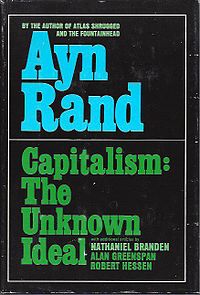In ethical philosophy, ethical egoism is the normative position that moral agents ought to act in their own self-interest. It differs from psychological egoism, which claims that people can only act in their self-interest. Ethical egoism also differs from rational egoism, which holds that it is rational to act in one's self-interest. Ethical egoism holds, therefore, that actions whose consequences will benefit the doer are ethical.

Human rights are universally recognized moral principles or norms that establish standards of human behavior and are often protected by both national and international laws. These rights are considered inherent and inalienable, meaning they belong to every individual simply by virtue of being human, regardless of characteristics like nationality, ethnicity, religion, or socio-economic status. They encompass a broad range of civil, political, economic, social, and cultural rights, such as the right to life, freedom of expression, protection against enslavement, and right to education.
Objectivism is a philosophical system named and developed by Russian-American writer and philosopher Ayn Rand. She described it as "the concept of man as a heroic being, with his own happiness as the moral purpose of his life, with productive achievement as his noblest activity, and reason as his only absolute".

The Universal Declaration of Human Rights (UDHR) is an international document adopted by the United Nations General Assembly that enshrines the rights and freedoms of all human beings. Drafted by a UN committee chaired by Eleanor Roosevelt, it was accepted by the General Assembly as Resolution 217 during its third session on 10 December 1948 at the Palais de Chaillot in Paris, France. Of the 58 members of the United Nations at the time, 48 voted in favour, none against, eight abstained, and two did not vote.
Civil and political rights are a class of rights that protect individuals' freedom from infringement by governments, social organizations, and private individuals. They ensure one's entitlement to participate in the civil and political life of society and the state.
Rights are legal, social, or ethical principles of freedom or entitlement; that is, rights are the fundamental normative rules about what is allowed of people or owed to people according to some legal system, social convention, or ethical theory. Rights are an important concept in law and ethics, especially theories of justice and deontology.
Some philosophers distinguish two types of rights, natural rights and legal rights.
The quotation "all men are created equal" is found in the United States Declaration of Independence. The final form of the sentence was stylized by Benjamin Franklin, and penned by Thomas Jefferson during the beginning of the Revolutionary War in 1776. It reads:
"We hold these truths to be self-evident, that all men are created equal, that they are endowed by their Creator with certain unalienable Rights, that among these are Life, Liberty and the pursuit of Happiness."
The harm principle holds that the actions of individuals should be limited only to prevent harm to other individuals. John Stuart Mill articulated the principle in the 1859 essay On Liberty, where he argued that "The only purpose for which power can be rightfully exercised over any member of a civilized community, against his will, is to prevent harm to others." An equivalent was earlier stated in France's Declaration of the Rights of Man and of the Citizen of 1789 as, "Liberty consists in the freedom to do everything which injures no one else; hence the exercise of the natural rights of each man has no limits except those which assure to the other members of the society the enjoyment of the same rights. These limits can only be determined by law." It finds earlier expression in Thomas Jefferson's 1785 "Notes on the State of Virginia," Query 17 (Religion) in which he writes, "The legitimate powers of government extend to such acts only as are injurious to others."

Global justice is an issue in political philosophy arising from the concern about unfairness. It is sometimes understood as a form of internationalism.
Cultural rights are rights related to themes such as language; cultural and artistic production; participation in cultural life; cultural heritage; intellectual property rights; author's rights; minorities and access to culture, among others. The cultural rights movement has provoked attention to protect the rights of groups of people, or their culture, in similar fashion to the manner in which the human rights movement has brought attention to the needs of individuals throughout the world.
Negative and positive rights are rights that oblige either inaction or action. These obligations may be of either a legal or moral character. The notion of positive and negative rights may also be applied to liberty rights.

Capitalism: The Unknown Ideal is a collection of essays, mostly by the philosopher Ayn Rand, with additional essays by her associates Nathaniel Branden, Alan Greenspan, and Robert Hessen. The authors focus on the moral nature of laissez-faire capitalism and private property. They have a very specific definition of capitalism, a system they regard as broader than simply property rights or free enterprise. It was originally published in 1966.
While belief in the sanctity of human life has ancient precedents in many religions of the world, the foundations of modern human rights began during the era of renaissance humanism in the early modern period. The European wars of religion and the civil wars of seventeenth-century Kingdom of England gave rise to the philosophy of liberalism and belief in natural rights became a central concern of European intellectual culture during the eighteenth-century Age of Enlightenment. Ideas of natural rights, which had a basis in natural law, lay at the core of the American and French Revolutions which occurred toward the end of that century, but the idea of human rights came about later. Democratic evolution through the nineteenth century paved the way for the advent of universal suffrage in the twentieth century. Two world wars led to the creation of the Universal Declaration of Human Rights.

Natural-rights libertarianism is the theory that all individuals possess certain natural or moral rights, mainly a right of individual sovereignty and that therefore acts of initiation of force and fraud are rights-violations and that is sufficient reason to oppose those acts. This is one of the two ethical view points within right-libertarianism, the other being consequentialist libertarianism which only takes into account the consequences of actions and rules when judging them and holds that free markets and strong private property rights have good consequences.
The right to development is a human right that recognizes every human right for constant improvement of well-being. It was recognized by the United Nation as an international human right in 1986.
The multilateral foreign policy of the Holy See is particularly active on some issues, such as human rights, disarmament, and economic and social development, which are dealt with in international fora.
The Declaration of Human Duties and Responsibilities (DHDR) was written for reinforcing the implementation of human rights under the auspices of the UNESCO and the interest of the Office of the United Nations High Commissioner for Human Rights and was proclaimed in 1998 "to commemorate the 50th anniversary of the Universal Declaration of Human Rights (UDHR)" in the city of Valencia. Therefore, it is also known as the Valencia Declaration.
An individual is one that exists as a distinct entity. Individuality is the state or quality of living as an individual; particularly as a person unique from other people and possessing one's own needs or goals, rights and responsibilities. The concept of an individual features in many fields, including biology, law, and philosophy. Every individual contributes significantly to the growth of a civilization. Society is a multifaceted concept that is shaped and influenced by a wide range of different things, including human behaviors, attitudes, and ideas. The culture, morals, and beliefs of others as well as the general direction and trajectory of the society can all be influenced and shaped by an individual's activities.
The philosophy of human rights attempts to examine the underlying basis of the concept of human rights and critically looks at its content and justification. Several theoretical approaches have been advanced to explain how and why the concept of human rights developed.





